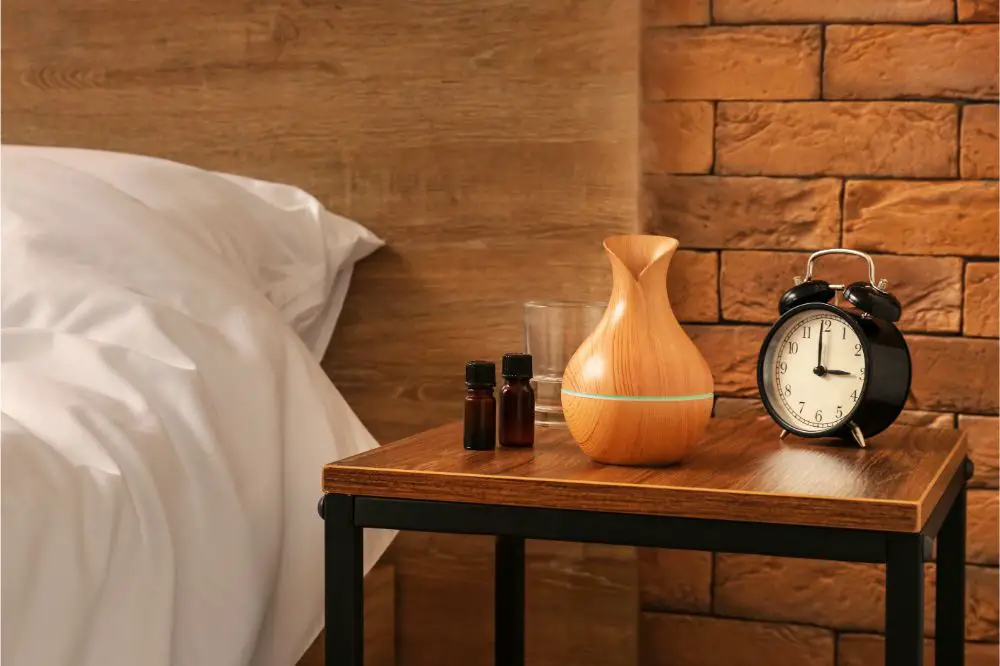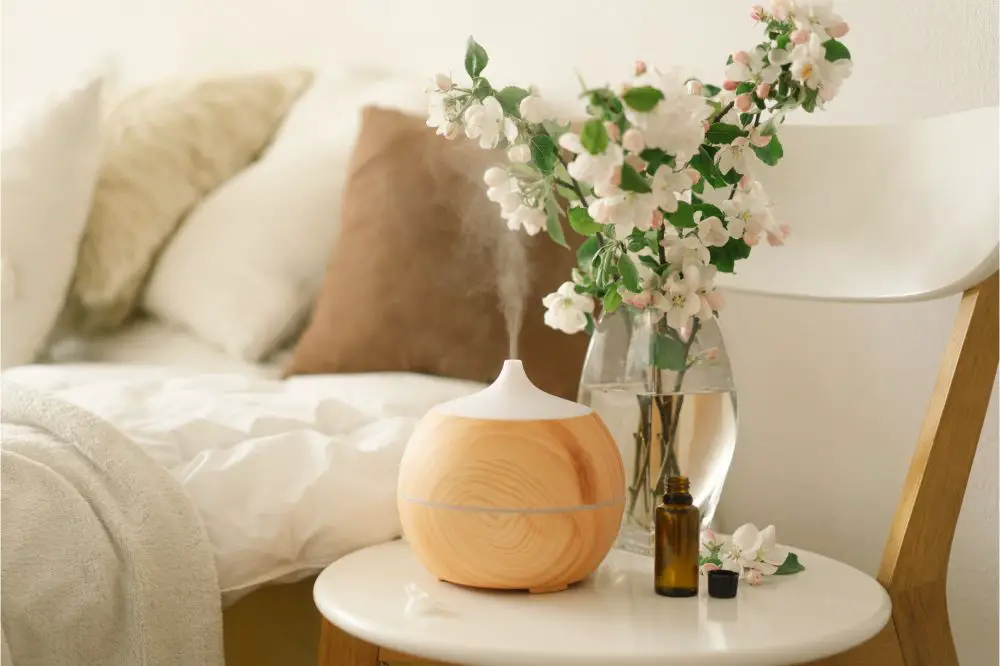As a BetterHelp affiliate, we receive compensation from BetterHelp if you purchase products or services through the links provided
An oil diffuser is a device that breaks down essential oils into smaller molecules. It disperses the oils into thin air to create a pleasurable effect that can also be calming. The effect will depend on the oil put into the diffuser. Each essential oil has what it is designed to do; lavender essential oil, for instance, is supposed to support sleep.
The job of an essential oil diffuser is to evenly disperse the oil particles at a concentration level that is comfortable, easy to breathe in, and not too concentrated in the room where it is dispersed. In the most simple terms, an oil diffuser is used to fill the atmosphere in a room with small, breathable particles of essential oils that are beneficial and give the room a nice ambiance.
Types Of Oil Diffusers
There are four different types of oil diffusers on the market. Depending on the effect you desire and the limitations you have in your space, you can select your diffuser.
1. Evaporative Diffusers: In this diffuser, a small fan is used to assist the conversion of oil into gas. It makes the oil evaporate into the air. Although, as the oil evaporates, it loses a measure of its potency and strength. Evaporative oil diffusers are a good choice for those who desire quick and occasional aromatic sensations.
2. Heat/Electric Diffusers: Rather than employing the use of a fan to convert the oil to gas, this kind of diffuser uses heat or electricity to do the conversion. Heating an essential oil can have different effects; though it has the ability to alter the properties of the oil, it can either make it more or less intense, depending on the properties of the oil. This kind of diffuser works without any form of noise. There are multiple types of heat diffusers such as candle diffusers, lamp ring diffusers, and electric heat diffusers.
3. Ultrasonic Diffusers: This favorite diffuser breaks up oil molecules into a fine mist. For the diffuser’s electronic vibrations to disperse the essential oil as a mist, you need to dilute it with water. Ultrasonic diffusers function similarly to cold humidifiers, making them an excellent option for adding water to the atmosphere, particularly during the winter months. Because oils are harmful to plastic, the plastic ultrasonic components must be cleaned.
4. Nebulizing Diffusers: Pressurized air is used to distribute an oil mist in these diffusers. Oil is drawn to the top of a distribution conduit by a vacuum, producing an explosion of scent into the air. Water and heat aren’t required for nebulizing diffusers, making them a low-maintenance option. For the environmentally conscientious consumer, these are plastic-free.
Advantages Of Oil Diffusers
Primarily, essential oils enable you to breathe easier. Many essential oils are said to have medicinal or therapeutic properties, such as eucalyptus, which is used to treat colds and respiratory problems. Eucalyptus oil helps clear airways that have been blocked due to allergies or a cold, and it can aid in sleep and rehabilitation. Basil oil might aid digestion and relieve muscle aches.
When you go home from work, for example, using lavender oil can signal that it’s time to start slowing down, turn off the technology, shower, read a book, etc. This is owing to its sedative effects and soothing properties.
How Oil Diffusers Aid Sleep
Oil diffusers can be used as an ally for sleep. It is not news that a good night’s sleep is key to your health and having a happy, sound mind. The length of sleep and sleep quality are equally important when you sleep. Even with the greatest bedding, calming the body and mind before going to the bedroom for sleep can be difficult. It’s time to experiment with essential oils. Essential oil extracts, which are considered more powerful than the plants from which they emanate, have been in use for eons to promote body, mental, and spiritual well-being — and diffusing them in your bedroom at night is a simple, all-natural approach to improve your sleep.
The process you can employ goes like this: Watch as the vapor travels out of the little open top of the diffuser after a few drops of essential oil are dropped into the water. The relaxing effects will be felt – and smelled – almost immediately. Oil diffusers disperse aromatherapy vapors across a room, making them ideal for usage in guest rooms and children’s rooms as a natural sleep aid. They’re also long-lasting. So, whether you’re taking a quick nap or settling in to rest for the day, you can be assured that you’ll get a good night’s sleep!
The content, scent, and benefits of each essential oil are unique. We recommend experimenting with a few different oils in your diffuser to see which ones you prefer. You can also play around with other essential oil blends.

Best Essential Oils For Sleep
Diffusers come in a variety of shapes and sizes in the diverse diffuser world. The majority perform the same basic function: they disperse essential oils into a space through a mist, giving a pleasant smell. Many of them also function as humidifiers, which give moisture to your home and can be beneficial if you have cracked lips or scaly skin, live in a dry environment, or use an air conditioner. You need to be able to ascertain which essential oil is best for you.
Some of the best essential oils include:
1. Lavender oil: Lavender oil is popular for its numerous benefits, but it is also exceptional at helping to make sleep easy. Inhaling lavender oil has been shown to help prevent insomnia in numerous trials. This is primarily due to the other lavender oil advantages, which include decreasing pulse rate, blood pressure, and temperature which imitate the stages the human body passes through when falling into a state of sleep. Lavender oil can help relieve anxiety, which is important for relaxation after a stressful day filled with various challenges.
2. Chamomile Oil: The calming properties of chamomile oil and its benefits in promoting sleep cover a broader area than specifics. The instant effects of chamomile oil on the body’s normal rhythms and temperature are not too glaring, but the faint floral perfume has a soothing impact on the mind when it is diffused into the atmosphere. Roman chamomile is especially great for calming tension due to its fresh, apple-like scent.
3. Peppermint Oil: Despite the fact that peppermint oil cannot be classified as a natural sleep aid, it successfully stimulates relaxation by helping to clear your mind. Peppermint oil has a lovely perfume that can be calming, but if you experience a seasonal allergic reaction or dust intolerance, nothing can help relieve the symptoms more effectively than dispersing some peppermint oil in the air of your bedroom. The transition from comfort for your irritated nasal passages to a relaxed state and ultimately sleep is swift and pleasurable.
4. Clary Sage Oil: Clary sage oil is indeed a must-have for depression sufferers. Clary sage oil, unlike normal sage, excels at battling the dark thoughts that plague people as the day gives way to night and will ease your troubled mind enough to help ease you over all those barriers into a deep, restful slumber.
Conclusion
Essential oils used in combination with the right oil diffusers are a great way to help put yourself to sleep, especially if you have been battling insomnia or have any difficulties with sleep.
- 3 Ways Wearing a Hat Can Help Lower Your Stress Levels - April 19, 2025
- Breaking the Silence: Why Men’s Mental Health Matters More Than Ever - April 15, 2025
- How to Transform a Home’s Patio Space into a Relaxing Space - March 23, 2025
This site contains affiliate links to products. We will receive a commission for purchases made through these links.



